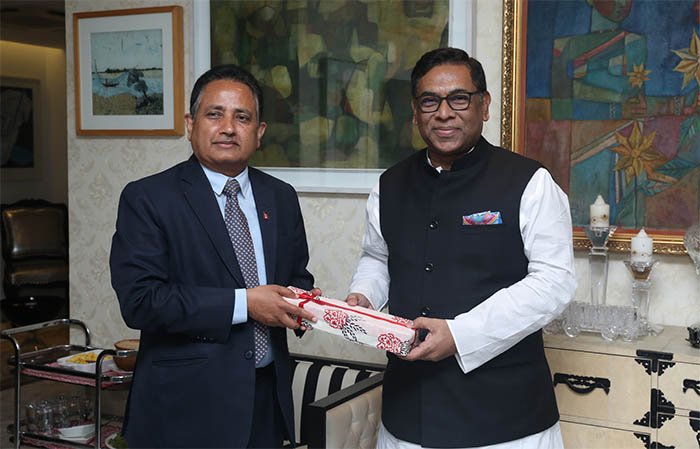
Bangladesh and Nepal have agreed to make joint investments in hydropower projects.
The decision was taken at the Energy Secretary level meeting between the two nations recently which included the projects covered by the whitepaper issued by the previous meeting a year back.
The two-day Joint Steering Committee (JSC) meeting on energy cooperation between the two countries has also decided to hold talks with India to export power from Nepal to Bangladesh by utilizing electricity transmission lines of India.
The Second meeting of Joint Steering Committee (JSC) of Nepal and Bangladesh on Cooperation in the Field of Power Sector was held in Cox's Bazar, Bangladesh on June 21, 2019.
The Bangladesh delegation was led by Dr. Ahmad Kaikaus, Senior Secretary of Power Division, and the Nepali delegation was led by Dinesh Kumar Ghimire, Secretary of Ministry of Energy, Water Resources and Irrigation of Nepal.
As per the previous pact, Nepal and Bangladesh had agreed to cooperate on electricity generation, development of hydroelectricity, cross-border transmission lines, development of efficient human resources in the hydroelectric sector, promotion of government-to-government and private sector investments, grid connectivity and investment in renewable energy, among others.
Energy Secretary of Nepal Dinesh Kumar Ghimire was quoted in Nepal media that the recent meeting agreed for the joint investment on hydropower, collaboration, and cooperation on alternative energy and electricity export to Bangladesh.
The whitepaper issued by Nepal's Finance Ministry a year back had included 962 MW capacity holding Tamor reservoir, 800 MW Dudhkoshi project which has a reservoir, 725 MW Upper Arun, 450 MW Kimathanka Arun, 679 MW Lower Arun.
Likewise, Sunkoshi-II 1,110 MW, Sunkoshi-III 536 MW, Tamakoshi-V 101 MW, Khimti Shiwalaya 500 MW and Kokhajor Reservoir 111 MW also are included in the then issued whitepaper. The whitepaper had enlisted a total of 20 Hydropower projects.
In the latest round of meeting, the Energy secretaries also agreed to make a selection of the projects on the basis of potentiality and present it in next round of meeting with preparations over the technical aspects, the report further added.
Bangladesh has formulated a policy to import 9,000 MW electricity from Nepal by 2040. For this, the construction of transmission line, selection of projects and cooperation on alternative energy are in focus.
And Nepal’s power generation is poised to surge in the next fiscal year as 43 projects with installed capacity of 1,149 MW are expected to roar into life.
As per the preliminary agreement, both the nations will use Indian infrastructures for the immediate purpose also with the aim to build a transmission line via India in the near future.
As per the report, both the nations came over the idea of building a transmission line via India as India released a new transnational electricity supply master plan which further facilitates the aim set by the two nations.
For now, Bangladesh has shown its interest to invest in 1,110 MW Sunkoshi-II and 536 MW Sunkoshi-III.
Prior to this Bangladesh already had made a theoretical agreement over purchasing 500MW electricity produced from Upper Karnali Hydel Project which has the capacity of producing 900MW electricity.
Indian company -- Grandhi Mallikarjuna Rao (GMR) -- is investing in the Upper Karnali hydel project.
The meeting also reviewed the progress on the decisions of first JSC meetings held on 4th December, 2018 at Kathmandu, Nepal and second JWG meeting held on 20th June, 2019 at Cox's Bazar, Bangladesh. The Co-chairs of JWG from both sides appraised the deliberations of the second JWG meeting to the JSC.
The JSC endorsed the proposal of JWG for utilizing the transmission lines planned to be constructed by Nepal for different hydropower projects in different time frames up to India - Nepal border for power trading between Nepal and Bangladesh.
However, the JSC opined that power trading mechanism may be outlined by taking into account the Guidelines for Import/Export (Cross Border) of Electricity-2}L8 issued by Ministry of Power of India in December, 2018 as well as Central Electricity Regulatory Commission (Cross Border Trade of Electricity) Regulations, 2019 issued in March,2019.
Bangladesh side highlighted that the factors of variation in seasonal and diurnal peak/off-peak demand in both countries shall have to be considered for efficient trading of power.
The JSC noted the deliberations of JWG on the outcome of the first Joint Technical Team - Generation (JTT-G) meeting held on June 19, 2019 and endorsed its recommendations.
The JTT shall also assess the peaking requirements of both the countries while short-listing and prioritizing the projects for investment.
Further, the JSC instructed the JTT- G to meet frequently to share all the available study reports, data and information necessary for identifying techno-commercially viable project(s) from the list furnished by Nepali side.
The JSC endorsed JWG's proposal for developing the suitable transmission system up to Bangladesh-India border for cross-border power trading. JSC also noted JWG's proposal for building Nepal's transmission system up to various interconnection points at Nepal-India border.
Bangladesh side informed that in the fifteenth JSC meeting between Bangladesh and India, both sides agreed to build transmission lines in synchronous mode for smooth exchange of power between the countries.
The JSC also endorsed the JWG's proposal for arranging the interconnection of transmission line between Bangladesh and Nepal across India as per the Guidelines for Import/Export (Cross Border) of Electricity-2)|8 issued by Ministry of Power, Government of India in December, 2018 as well as Central Electricity Regulatory Commission (Cross Border Trade of Electricity) Regulations, 2019 issued in March, 2019.
The JSC instructed JTT-T to explore the options for having dedicated transmissions lines between Bangladesh and Nepal for long term power transaction as provisioned in the Guidelines for Import/Export (Cross Border) of Electricity-2018 issued by Government of India.
JSC agreed that both sides will share their generation plans with each other time to time which will help them to identify the timely procurement of quantum of power through cross border power trading.



